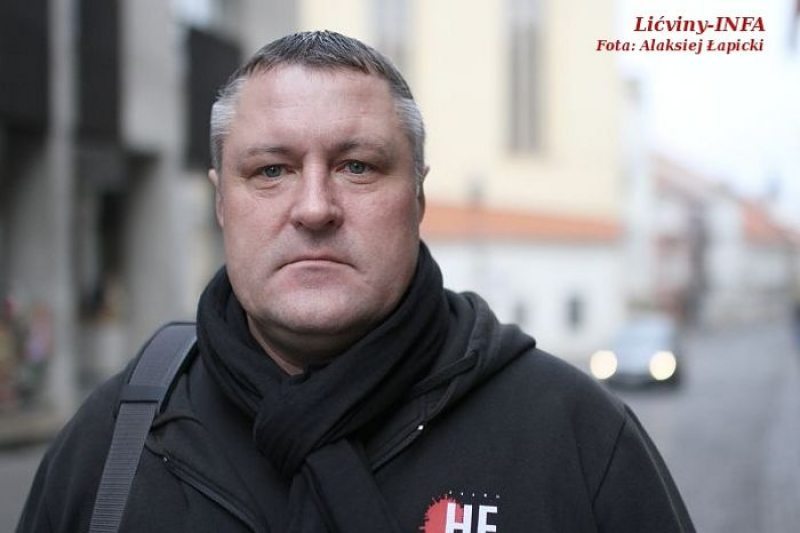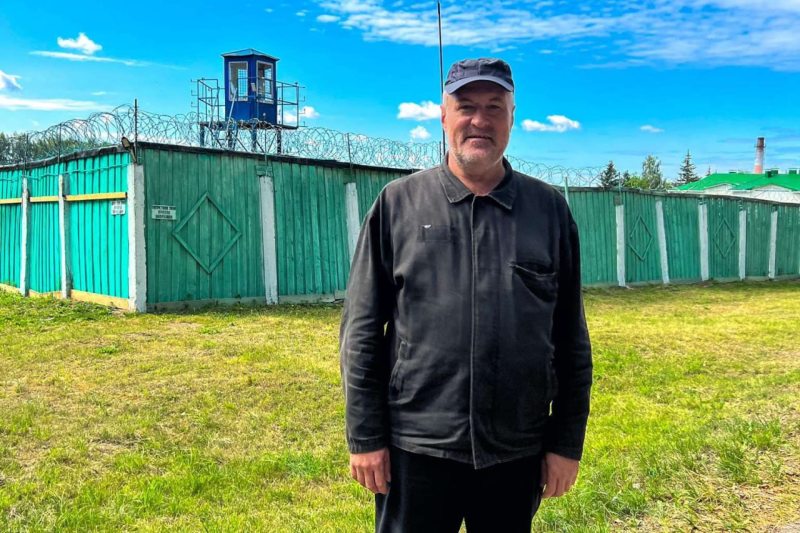Leanid Sudalenka: “My mother thought I was working abroad for 3 years”
Shortly after his release from prison, Viasna human rights defender Leanid Sudalenka gave an interview to Narodnaya Volya media. Viasna publishes its abridged translation.
Leanid Sudalenka: I was released around 9 in the morning today. At 5 o'clock was the wake-up call, breakfast was served at 5.30 – tea, bread, porridge...
But it should be noted that I was in solitary confinement for the last nine days and was released precisely from the disciplinary cell.

Leanid Sudalenka released after serving jail term in full
Narodnaya Volya: Why were you put there?
LS: For not changing into my sports uniform on time. For example, you have to go to the stadium at 2:00 p.m., and I was in the barracks in sports uniform at 1:30 p.m.
Interestingly, they gave me precisely nine days just before release, so I assume it was done intentionally. In the places I've been, it's pretty easy to pin a violation on someone.
NV: Were the last days before release exciting for you?
LS: There were days when I was sitting in a damp basement, not taken out for fresh air. They brought me meals three times a day, and that was all.
So, for nine days, I slept on the floor, without linen, without anything. At first, I used toilet paper as a pillow, but then it ran out. Then I had to use my fist as a pillow.
Those were the “exciting” days before my release.
NV: What was the most challenging part of being imprisoned for you?
LS: The hardest part was the lack of information. This is true. And I believe, not only for me but for many other prisoners.
By the way, behind bars, I met many people ready to sacrifice themselves for their beliefs. That was helpful and supportive.
NV: Could you talk to other prisoners, or were you isolated?
LS: I lived in a barrack and didn't have such isolation as Maksim Znak, who also is serving his sentence in that colony.
NV: Where was it harder for you: in the pre-trial detention center or the colony?
LS: I can say it is definitely better in the colony because there is some freedom there. You can see the sky and breathe fresh air, which was not the case in the Homieĺ pre-trial detention center.
In the Homieĺ detention center, where I spent more than a year, twelve people were in the cell. And except for me, everyone was smoking. Someone wakes up at 6 in the morning and smokes three cigarettes in a row.
For me, this was just torture and disaster. I even asked the detention center administration to transfer me to a non-smoking cell.
NV: Back to your arrest and sentence, was it surprising for you? Or were you inwardly prepared for the worst?
LS: I was in shock for the first few days after the detention. I was arrested while leaving my house, face down in the snow.
Only after a while in custody, I started to recover. I realized that the sentence would probably be the maximum—three years of imprisonment (by the way, now the same article provides for a maximum of four years). That's how it turned out.
But, compared to today, I see I didn't get the longest sentence. I saw in the colony how big the sentences are now—for likes on social media, comments, or shared posts.
So, you can say that I was “lucky” in some way to be among the first to be convicted after the events of 2020.
In my last word, I told the judge everything was clear about this case. It turned out that I am a person who helped other people and sacrificed my freedom for this help.
NV: You've probably played the situation over and over again when your term would end and you'd be free. Were there any cherished wishes?
LS: First of all, I dreamed of seeing my family—wife and children. Thank God they are here now. The family has been very supportive materially and morally, and they visited me.
I plan to visit my mother on Sunday, who is also waiting for me. She is 84 years old, lives in a village in the Brahin district, and still doesn't know where I was.
We didn't tell mom about it so that she wouldn't worry and take care of her health. We just told her that I had gone abroad to work for a few years. And now – I'm back!
NV: What are your plans after you return from “work abroad”?
LS: I need to look around, take care of my health. I still have a good head on one's shoulders—I think there will be work for me...


















